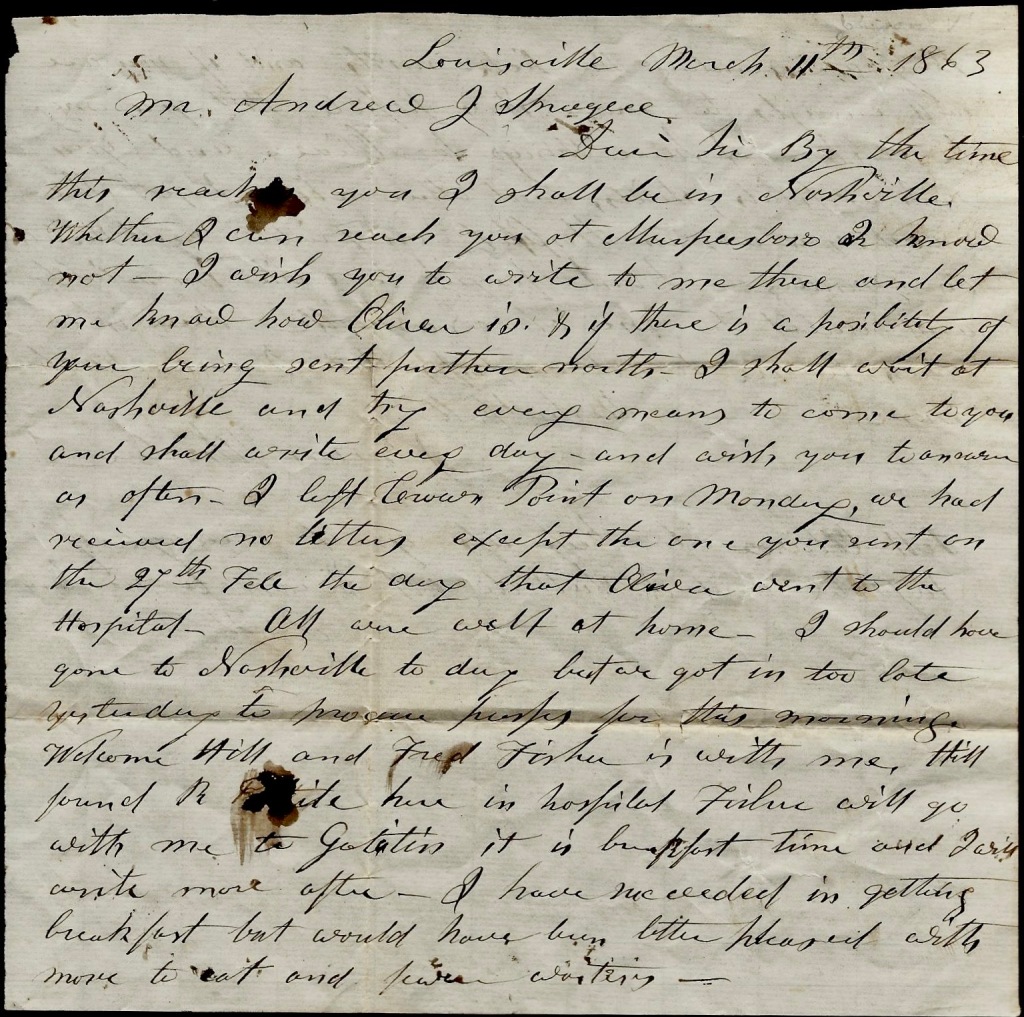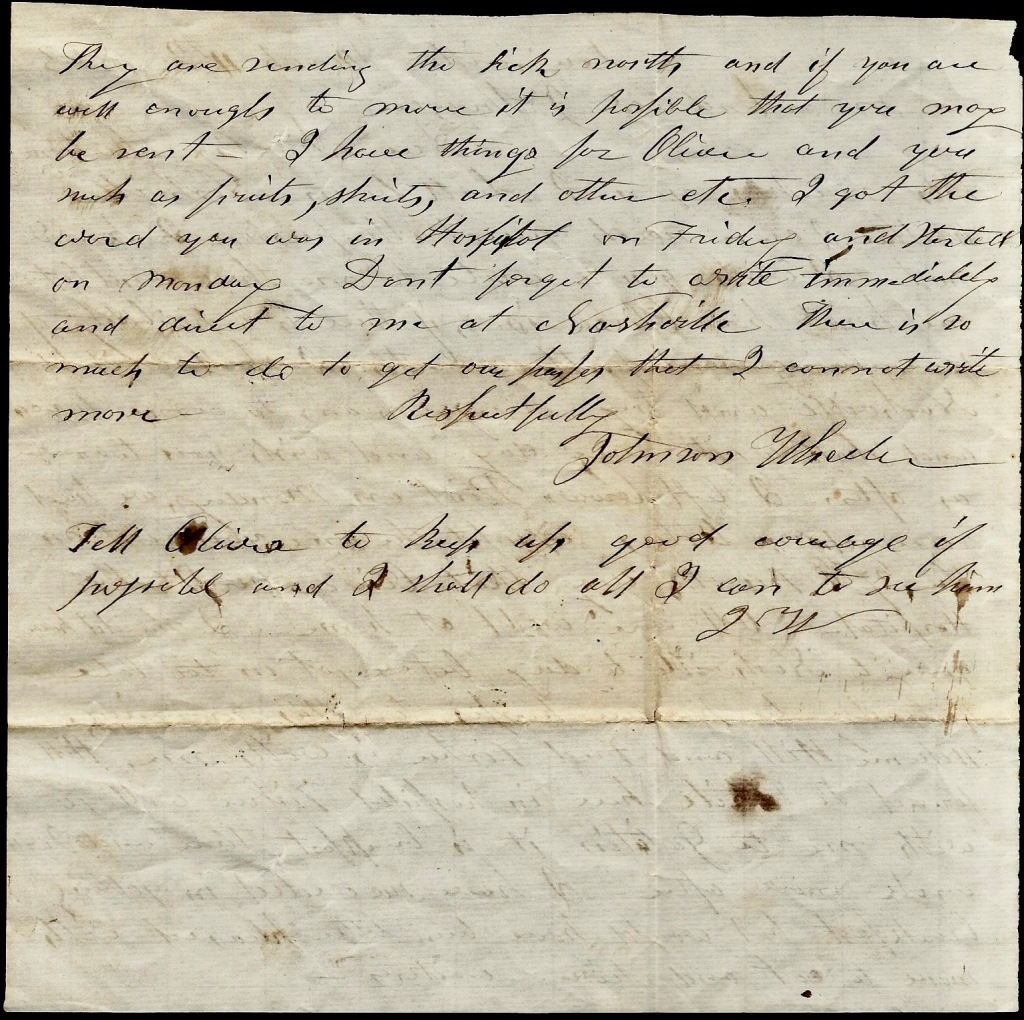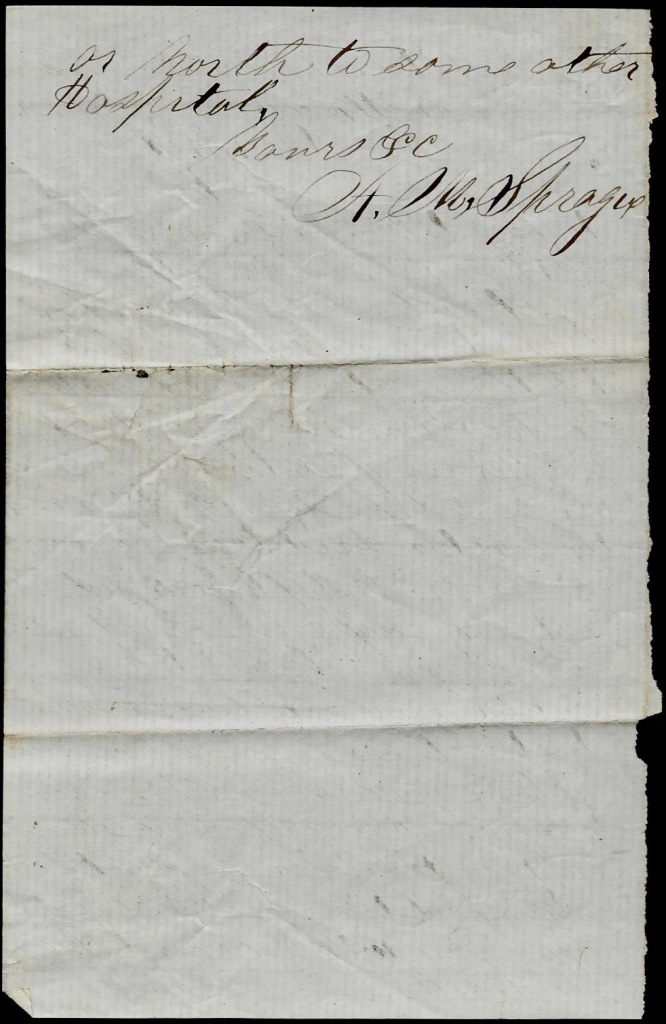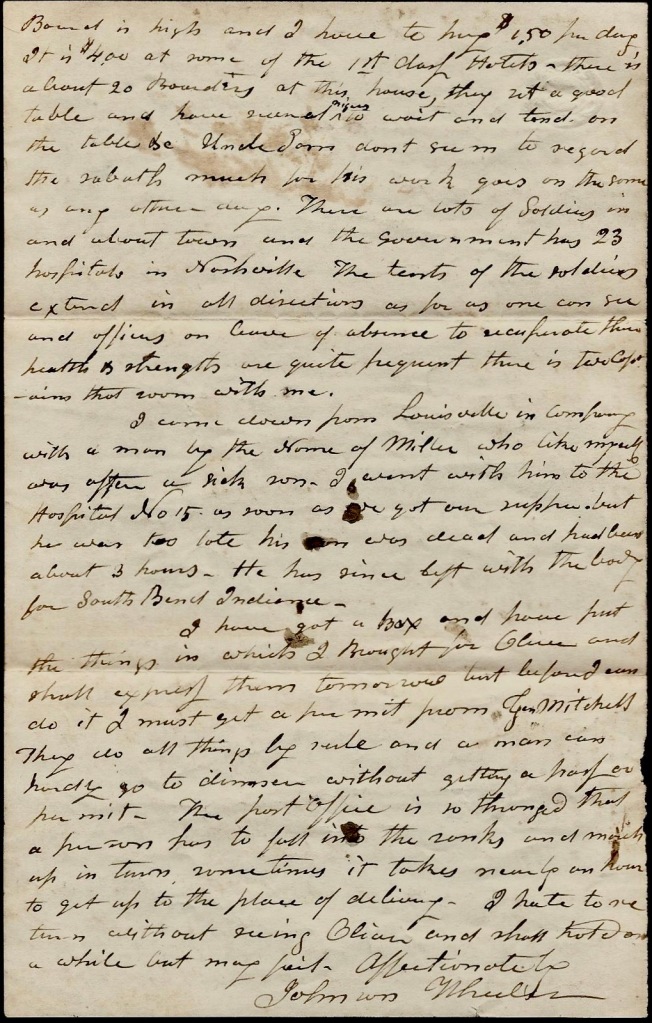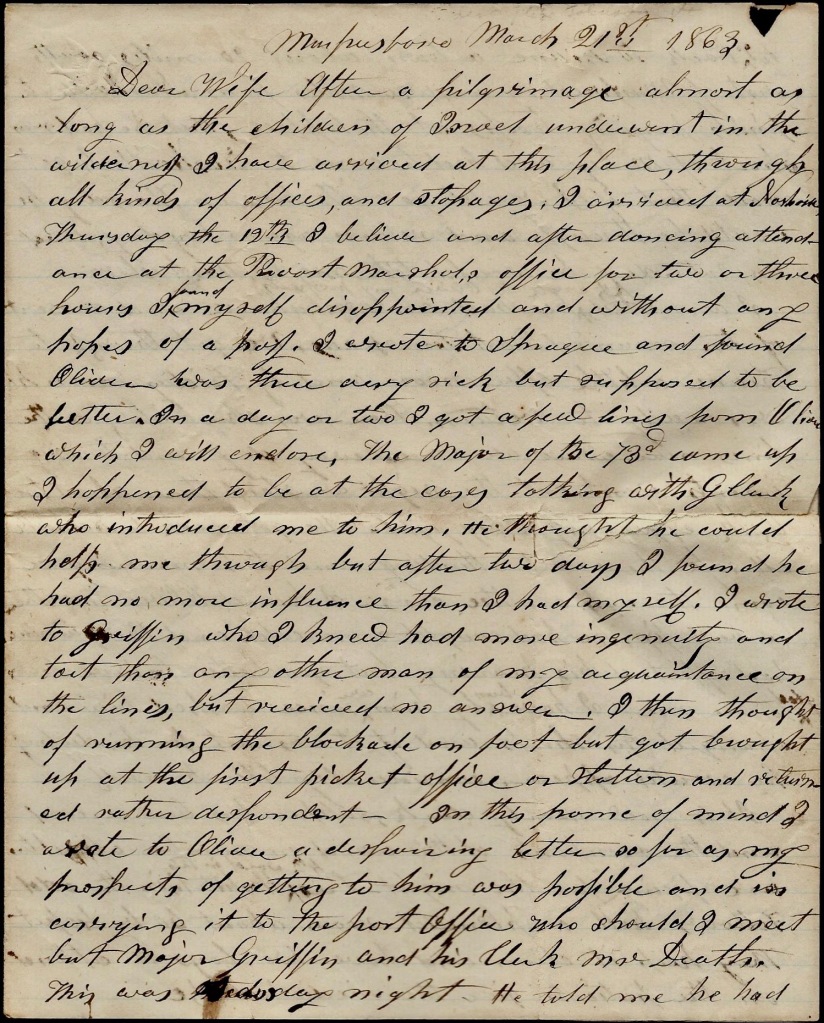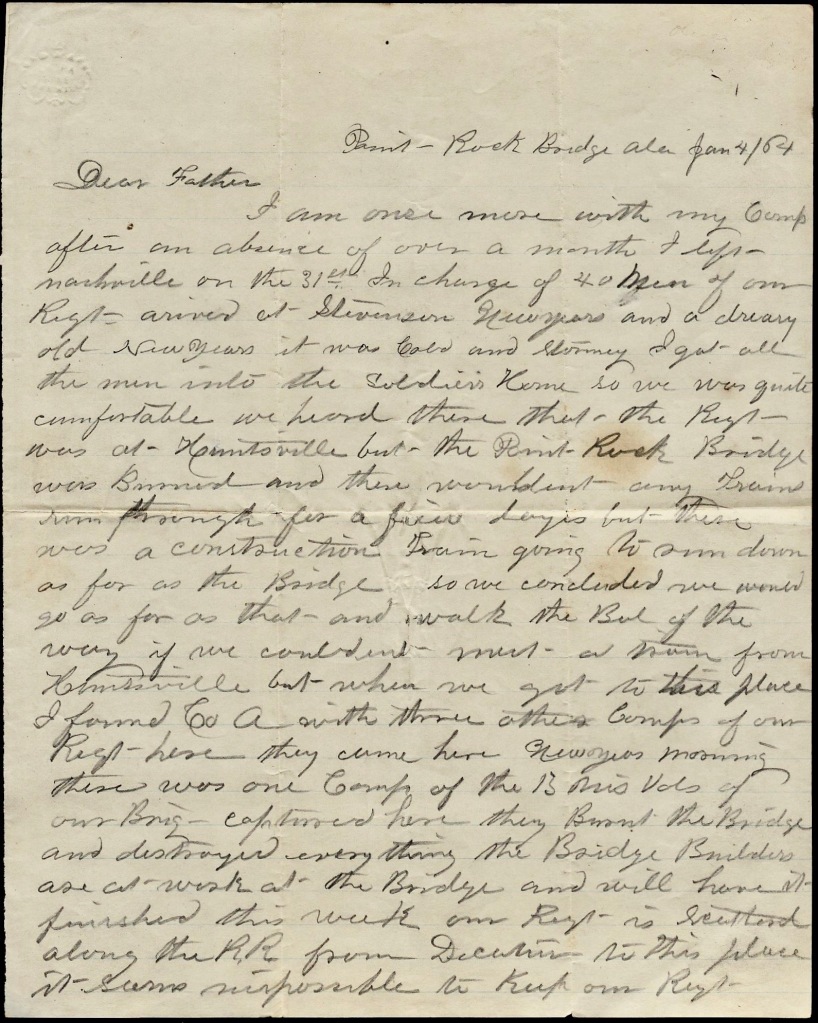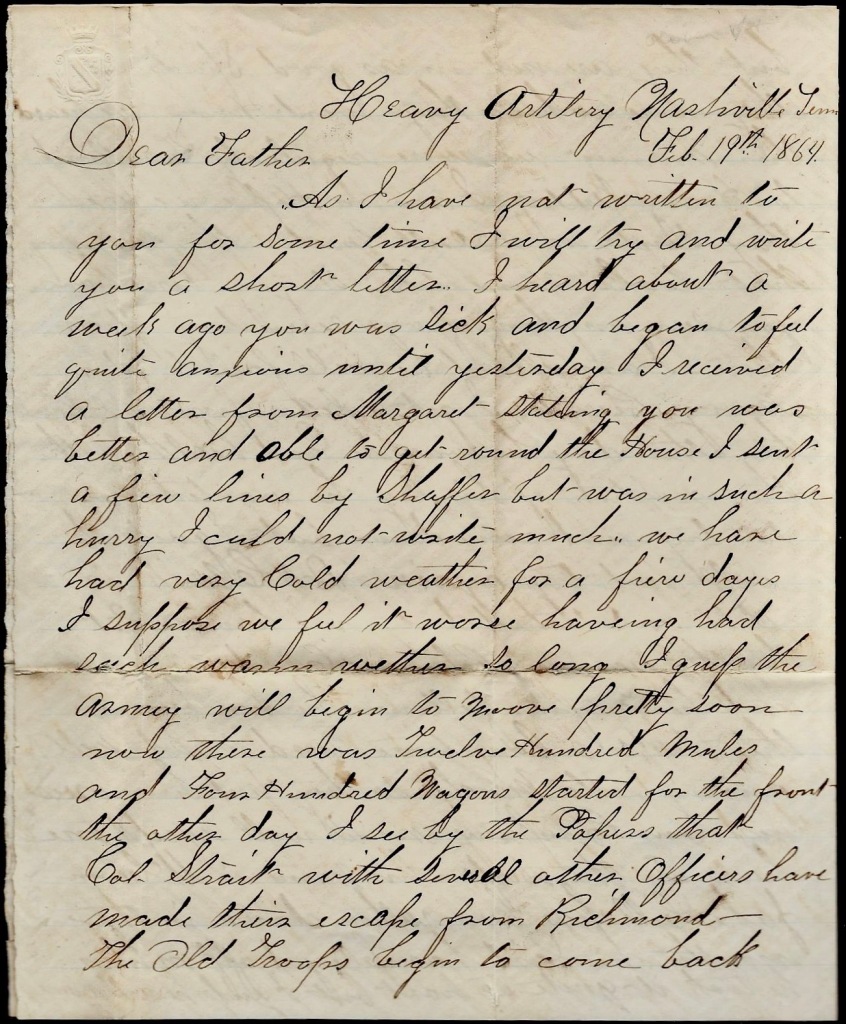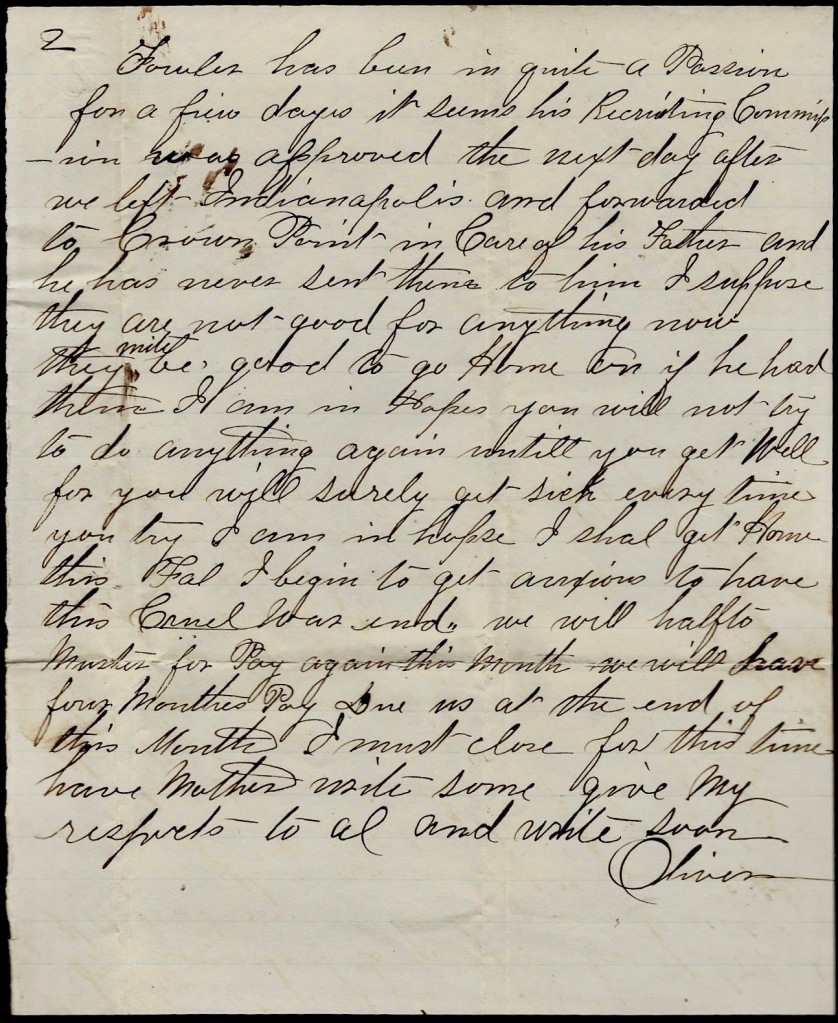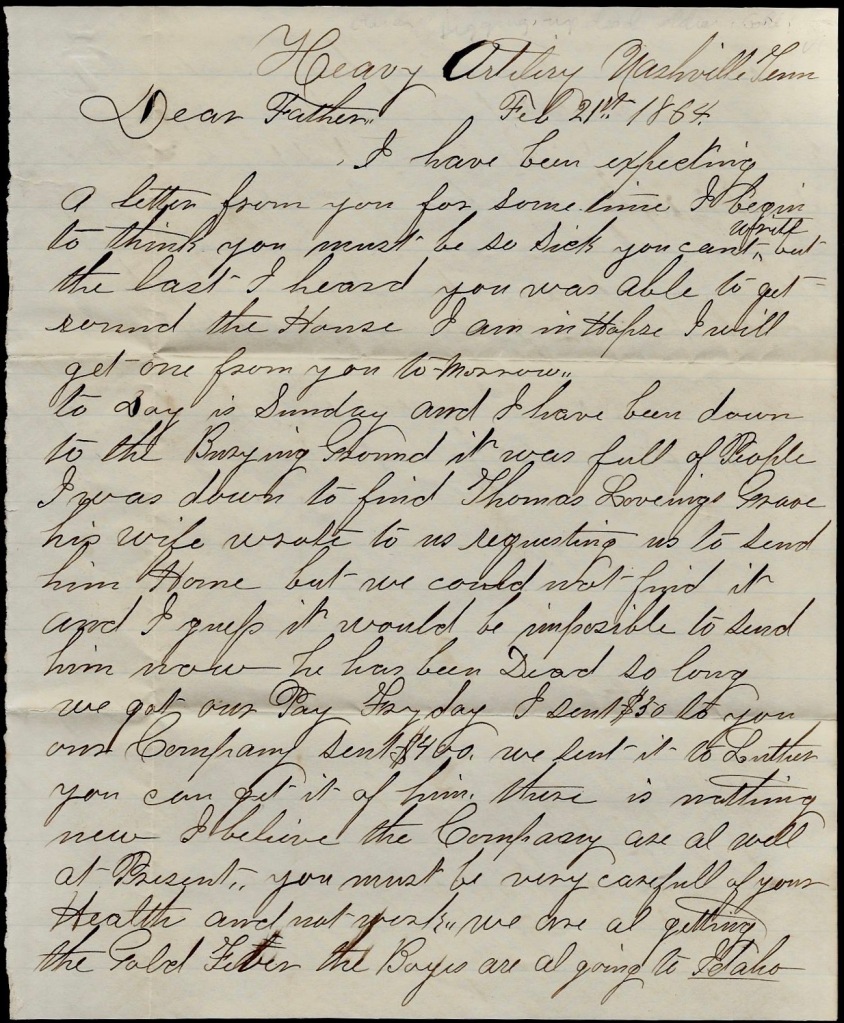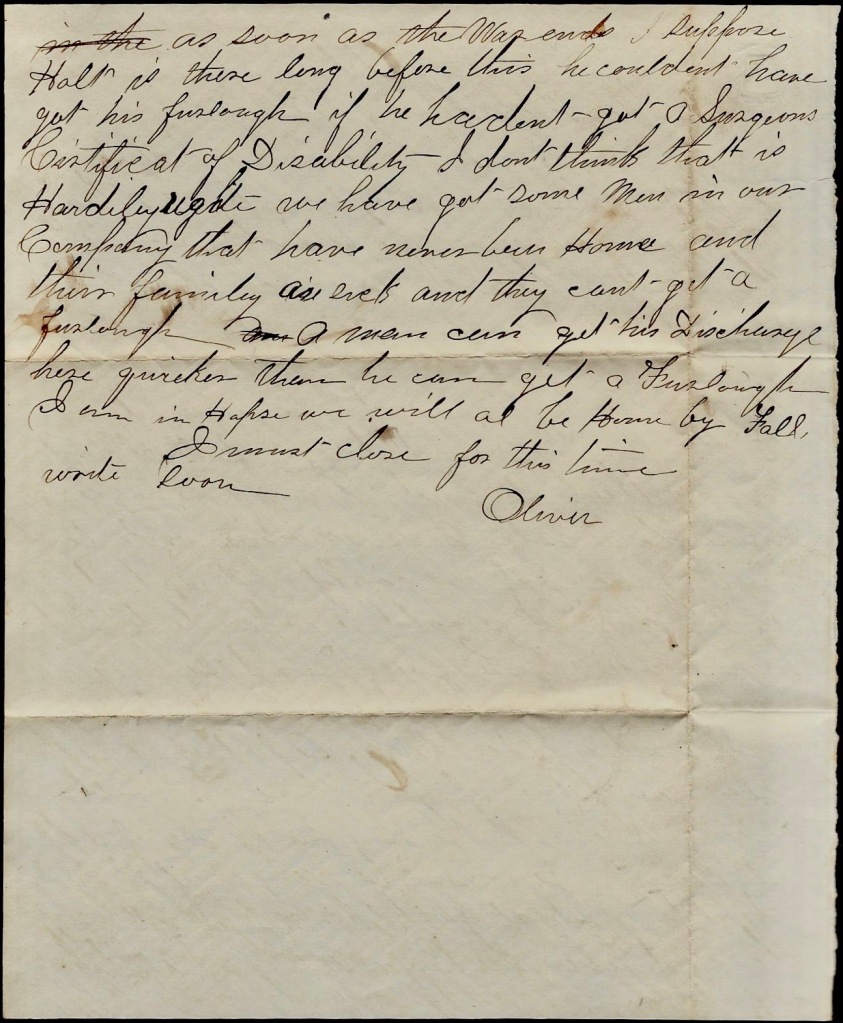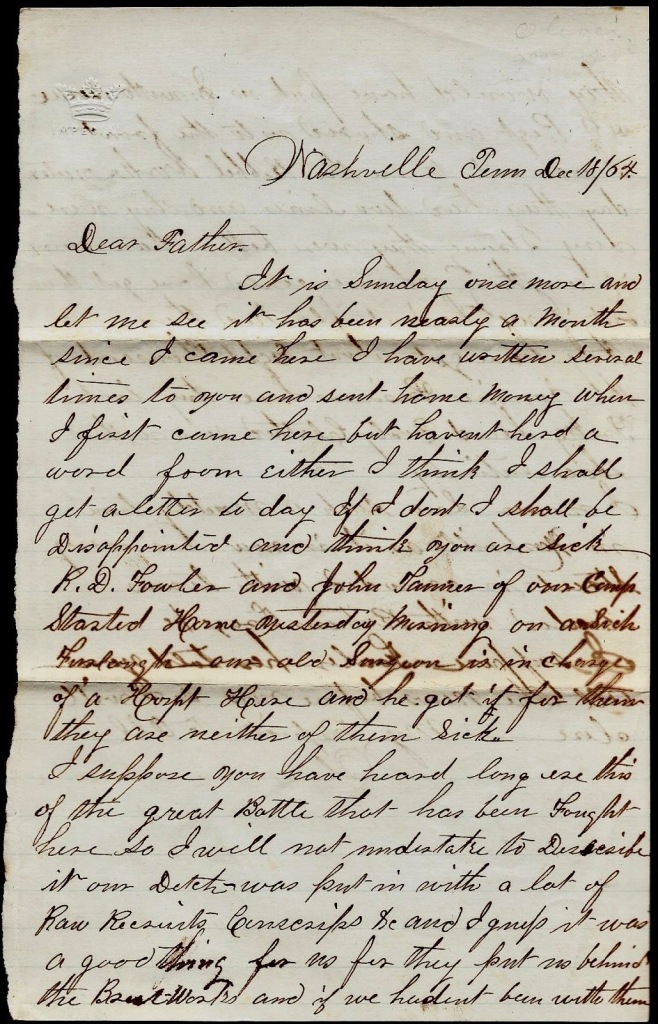These letters were written by Oliver G. Wheeler (1842-1928) of Co. A, 73rd Indiana Infantry. Oliver enlisted on 16 August 1862 as a corporal and he mustered out on 1 July 1865 as a sergeant.
Oliver was born in Erie county, Ohio, the son of Johnson Wheeler (1797-1870) and Sally Burr (1804-1858). After the war he married (in 1870) Alice Clark (1850-1932) and became a hardware merchant in Crown Point, Indiana.
Oliver’s brother, John Wheeler, also served in the Civil War. John started the war as the Captain of Co. B, 20th Indiana Infantry, and later rose in rank to Colonel of the regiment. He was killed at Gettysburg on 2 July 1863. See also—1861: John Wheeler to Johnson Wheeler.
This collection also includes three letters by Andrew M. Sprague of Co. A, 73rd Indiana Infantry, and several interesting letters by Oliver’s father, Johnson Wheeler.
Letter 1

Camp at Nashville, [Tennessee]
December 1st 1862
Dear Father,
I have just come in from picket and was surprised to find Bartlett Woods here. It seems he came here to see his sick son [Edmund Woods 1] but he was too late for he died last Saturday in the hospital in town. He had been sick ever since we left Louisville. He hadn’t ought to have come from there at all. He might have recovered his health if he had stayed there. We have lost 5 from our company now and about half are on the sick list. We have had rather bad luck with our sick. I don’t know where the fault is. It must be with the Colonel or with the Surgeon. I guess they are both to blame.
Our company went on picket last night at 5 o’clock and I never saw it rain so in my life. We got pretty wet but we soon dried ourselves by a big fire. We have heard the boom of artillery all the afternoon. Our Brigade was all ordered out but our regiment which was sent out to guard a forage train. They had quite a skirmish with a squad of rebels but I guess there wasn’t much blood spilled. I think we will make a forward move soon as they have got all the bridges repaired for several miles. I don’t think we will have any more hard marching such as we have had.
Mr. Woods said he was going to start back early in the morning and if I had any word to send I must get it ready tonight so I thought I would write a few lines and let you know I was well yet but don’t know how long I will continue so. I am in hopes I will keep well for I dread to get sick here for a sick man stands a small chance here. I feel sorry for Bart for he feels very bad indeed. I am in hopes four months more will put an end to this dreadful war but I can’t see as it’s any nearer to an end than it was a year ago. Do you?
I guess I will wait until morning before I close.
Tuesday morning, December 2nd. I must hurry and finish this and get ready for a Review and inspection of arms and clothing at 10 A. M. Mr. Woods thinks Bill will be with us in a week or two. I guess he—Mr. Woods—isn’t so much in favor of war as he was and I think if a good many others could come here and see how it is, they wouldn’t cry so loud. Do you remember them two Davises that hauled wood for us last winter? They came up missing the day before we came here and we think there is no doubt but they have deserted. If you see them back there, you will know what kind of a furlough they had. 2
I wrote to Bill the other day and told him to have George pay you $26. I don’t know whether he will do it or not. I don’t see why we don’t get our pay. We was mustered over a month ago.
If you get a chance to send here again, send me a pair of cowhide boots, No. 8, high-tops, and some socks and some kind of cheap gloves and that shirt Bill took back. I wish I had all my old clothes here to wear out. Woods says John Myers got his discharge and thinks Roll Fowler will get his. 3 He thinks this regiment has been sadly misused and I am of his opinion.
I received your letter of the 24th day before yesterday. They come through very quick now. I think it is a good thing for you to sell your horse for it would be impossible for you to take care of him this winter. It must be getting pretty cold weather there now. It’s quite warm here yet. Don’t send those things unless you are sure they will come through. Give my love to all the friends. And write every opportunity. From your loving son, — O
1 Edmund Woods was a private in Co. A, 73rd Indiana Infantry. He died at Nashville on 29 November 1862. Edmund’s father, Bartlett Woods was an emigrant from England and a farmer in Ross Township, Lake county, Indiana. 18 year-old Edmund was his oldest child.
2 Corp. William F. Davis and Pvt. Harvey A. Davis of Co. A, 73rd Indiana both deserted on 28 November 1862.
3 According to the company rolls, John Meyers of Crown Point deserted on 1 December 1862. Corp. Rollin D. Fowler, on the other hand, was not discharged and mustered out of the company in 1865 as a sergeant.
The following letter was written by Oliver’s father, Johnson Wheeler (1797-1870) to Sgt. Andrew Sprague of Co. A, 73rd Indiana Infantry.

Letter 2
Louisville [Kentucky]
March 11, 1863
Mr. Andrew J. Sprague
Dear Sir,
By the time this reaches you I shall be in Nashville. Whether I can reach you at Murfreesboro I know not. I wish you to write to me there and let me know how Oliver is & if there is a possibility of your being sent further north. I shall wait at Nashville and try every means to come to you and shall write every day and wish you to answer as often. I left Crown Point on Monday. We had received no letters except the one you sent on the 27th February—the day that Oliver went to the hospital. All were well at home. I should have gone to Nashville today but we got in too late yesterday to procure passes for this morning.
Welcome Hill 1 and Fred Fisher is with me. Hill found R. Hill here in hospital. Fisher will go with me to Gallatin. It is breakfast time and I will write more after.
I have succeeded in getting breakfast but would have been better pleased with more to eat and fewer waiters.
They are sending the sick north and if you are well enough to move, it is possible that you may be sent. I have things for Oliver and you such as fruits, shirts, and other etc. I got the word you was in hospital on Friday and started on Monday. Don’t forget to write immediately and direct to me at Nashville. There is so much to do to get our passes that I cannot write more.
Respectfully, — Johnson Wheeler
Tell Oliver to keep up good courage if possible and I shall do all I can to see him.
1 Welcome Hill (1818-1895) of Lake county, Indiana.
The following letter was written by Sgt. Andrew Sprague of Co. A, 73rd Indiana Volunteers, to Oliver Wheeler’s father, Johnson Wheeler (1797-1870).
Letter 3
Hospital No. 7
Murfreesboro, Tenn.
March 13, 1863
Mr. Wheeler
Dear Sir,
I received yours of yesterday but a moment ago and I hasten to answer immediately. Oliver is better on again slowly, I think, and the doctor gives us a good deal of encouragement and I think with good care, he is in no danger. He has had a pretty hard turn of the typhoid fever and it will take him some time to get well after the fever has broke.
I have no more to write. I am in hopes we shall see you tomorrow. I am not sure I can get this off today but will try. Yours truly, — A. M. Sprague
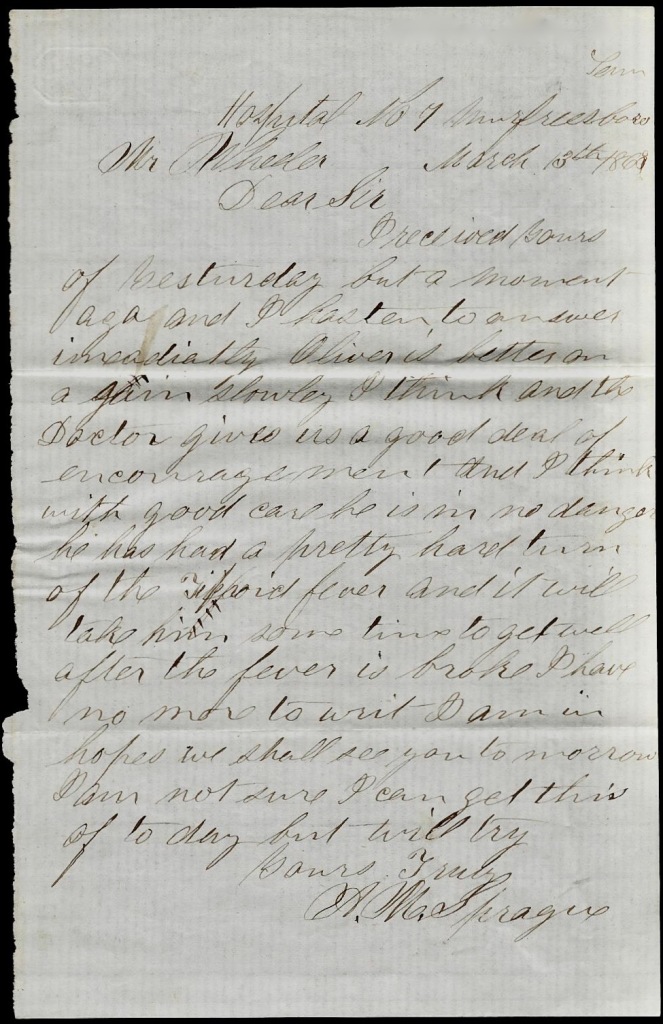
The following letter was written by Sgt. Andrew Sprague of Co. A, 73rd Indiana Volunteers, to Oliver Wheeler’s father, Johnson Wheeler (1797-1870).
Letter 4
Hospital No. 7
Murfreesboro, Tennessee
March 14, 1863
Mr. Wheeler
Dear Sir,
We looked today till our eyes ached for you but have not come yet but we shall look for you tomorrow but still I thought I would write a few lines. I cannot get a letter in after the cars come in so I did not write till night.
The doctor said that the fever was broke and if Oliver did not get any reckless, he would get along now without taking much more medicine—only to strengthen him. I have been rather poorly for the last day or so. You spoke of getting sent north. Oliver is not fit for transportation yet and I am in hopes you will get here to see about getting him sent home or north to some other hospital.
Yours &c. — A. M. Sprague
The following letter was written by Oliver’s father, Johnson Wheeler (1797-1870) to Oliver’s mother.
Letter 5
Nashville [Tennessee]
Sunday, March 15, 1863
Dear Wife,

I come on from Louisville on Thursday. Since then I have been here trying to get a pass to go on to Murfreesboro but have failed to get one. I have written to Sprague and got an answer. Oliver is some better and he thinks he will recover with good care and attention. This military law subjects some to much trouble but no doubt is beneficial as an army measure. I found [Sgt.] George Clark [of the 73rd Indiana] in the hospital last night. He is nearly recovered from his wound. I also saw Major [Ivan N.] Walker of the 73rd [Indiana]. He arrived on the last train from Murfreesboro. I shall call on him today at his boarding house on Summer Street, No. 158. If I cannot get down without [a pass], I shall telegraph direct to Gen. Rosecrans’ Headquarters.
I have taken a bad cold and cough some but don’t think it will be very bad.
I have had an opportunity to see the City. It covers a large extent of ground and some parts of it are splendid—the State House especially. There is quite a fleet of steamboats in the river unloading eternal lots of supplies for the Army. Board is high and I have to pay $1.50 per day. It is $4 at some of the 1st class hotels. There is about 20 boarders at this house. They set a good table and have several niggers to wait and tend on the tables &c.
Uncle Sam don’t seem to regard the Sabbath much for his work goes on the same as any other day. There are lots of soldiers in and about town and the government has 23 hospitals in Nashville. The tents of the soldiers extend in all directs as far as one can see and officers on leave of absence to recuperate their health and strength are quite frequent. There is two captains that room with me.
I come down from Louisville in company with a man by the name of [Aaron] Miller who like myself was after a sick son. I went with him to the [General] Hospital No. 15 as soon as we got our supper, but he was too late. His son was dead and had been about three hours. He has since left with the body for South Bend, Indiana. 1
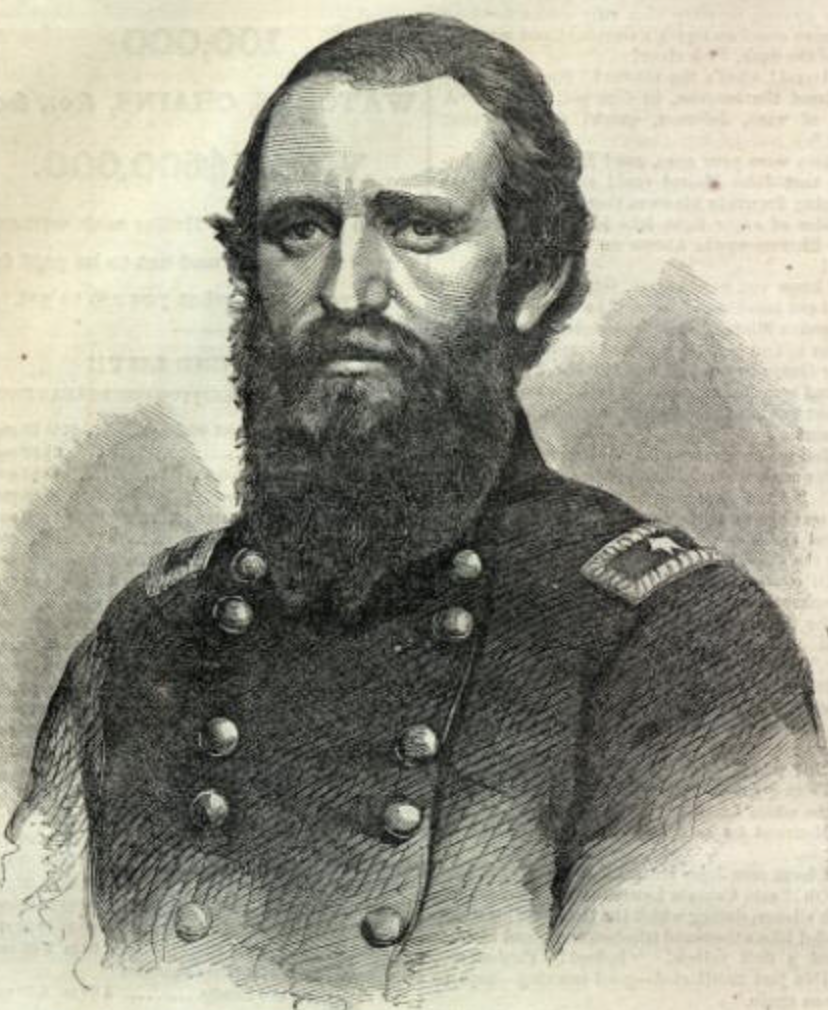
I have a box and have put the things in which I brought for Oliver and shall express them tomorrow but before I can do it, I must get a permit from Gen. Robert B. Mitchell. They do all things by rule and a man can hardly go to dinner without getting a pass or permit. The post office is so thronged that a person has to fall in the ranks and march up in turn. Sometimes it takes nearly an hour to get up to the place of delivery.
I hate to return without seeing Oliver and shall hold on awhile but may fail. Affectionately, — Johnson Wheeler
Since I wrote, I have been out to the cemetery there is only filled with soldiers in rows of a hundred or more each as thick as they could bury them.
1 The soldier was 24 year-old private Martin M. Miller who enlisted on 15 August 1862 at South Bend to serve in the 21st Light Artillery. He died in General Hospital No. 15 at Nashville on 12 March 1863 of typhoid fever. Martin was the son of Aaron Miller (1825-1892) of German township. Martin’s headstone lies broken and leaning against a tree in Mount Pleasant Cemetery in South Bend, Indiana (Row 4, near Edison Road).
The following letter was written by Johnson Wheeler (1797-1870) from Nashville to his son, Oliver Wheeler of Co. A, 73rd Indiana who was hospitalized in Murfreesboro, Tennessee.
Letter 6
Nashville [Tennessee]
March 18, 1863
Oliver G. Wheeler
Dear Son,
I am still here in Nashville and have been trying all the ingenuity which I can muster to get to where you are but have failed so far. Your Major Walker thought he could do it for me but like the rest of us, he did not know his own strength. Today I undertook to pass out by the turnpike but got brought up at the first station. Luckily I got a ride back and the trip only cost me my time. I expect I shall have to give it up and return home very much against my inclination.
If I was young and active as I once was, I could go through. But I am too old to pass off for a soldier and too much worn out to walk through and shun the guards which might be easily done. I wrote to Griffin and think he might get a pass for me if he would only try but you know he would not be apt to do much unless he could be well paid. If something don’t turn up in my favor, I shall have to start back on Friday, day after tomorrow morning. I shall possibly hear from you again tomorrow and hope you may still be gaining.
You have money and had best hold on to it. If you should get well enough to come north, I have no doubt you can either get a furlough or a discharge.
I have changed my boarding place and now pay only $1 per day. Major Walker’s father is boarding at the same place opposite the Planter’s Hotel. I shall see the Medical Director tomorrow morning. He helps manage the transfer of sick soldiers to other hospitals north, and shall write to you again before I leave. If I can learn anything that will be to your benefit, shall forward it.
I saw George Clark again this morning. His wound is nearly healed and would soon be well were it not that the rib was shattered and some small pieces of bone keep working out.
There was a great many soldiers went south this morning. I was at the depot to see them start. They seemed to go feeling quite well. If I had not been so old and gray-headed, I might have been passed on by changing overcoats. I could find them that are willing to do it. They said it was often done as no one would inquire.
I feel the worst I ever did to have to go back and not see you. I suppose you would give all your old shoes to see me. I have received three letters from you & Sprague & one from [Alfred] Fry. Your last enclosing the one from Eunice. I shall expect to get one tomorrow, After that, direct home to Crown Point. I shall write again before I go.
Affectionately, — Johnson Wheeler
My best respects to Mr. Sprague. I set a box yesterday to you which I hope will be beneficial. The wine will help strengthen and the shirts will keep you clean for awhile. The peaches and tea I hope will all do good.
The following letter was written by Oliver’s father, Johnson Wheeler (1797-1870) to Oliver’s mother.
Letter 7
Murfreesboro, [Tennessee]
March 21, 1863
Dear Wife,
After a pilgrimage almost as long as the children of Israel underwent in the wilderness, I have arrived at this place through all kinds of officers and stoppages. I arrived at Nashville, Thursday the 12th, I believe, and after dancing attendance at the Provost Marshal’s Office for two or three hours, I found myself disappointed and without any hopes of a pass. I wrote Sprague and found Oliver was there very sick but supposed to be better. In a day or two I got a few lines from Oliver which I will enclose.
The Major of the 73rd [Indiana] came up. I happened to be at the cars talking with G. Clark who introduced me to him. He thought he could help me through but after two days, I found he had no more influence than I had myself.
I write to Griffin who I knew had more ingenuity and tact than any other man of my acquaintance on the lines but received no answer. I then thought or running the blockade on foot but got brought up at the first picket office or station and returned rather despondent. In this frame of mind I wrote to Oliver a despairing letter so far as my prospects of getting to him was possible and in carrying it to the post office, who should I meet by Maj. [Elihu] Griffin 1 and his clerk, Mr. Death. This was Wednesday night. He told me he had to go back to Triune—a town about 20 miles southwest of Murfreesboro and 20 miles from Nashville to finish paying troops at that place, that he had run short of money and had to come back to Nashville to get more, [and] that if I could go with him on Thursday, he would go through and return again Friday, and on Saturday he would take me to Murfreesboro.
I consented and wrote to Oliver my prospects. He had an ambulance and an escort of ten mounted East Tennesseans. We got through to Triune a little after noon and by Friday noon he was ready to return. There was skirmishing on the lines near where we were every day and two regiments went out the night we stayed there about two o’clock expecting a big fight. We got back to Nashville all safe, the escort attending, and this morning we came through on the cars.
I found Oliver in rather a bad fix. He had caught some cold and the quinine had affected his hearing but you better believe he was glad to see me. I have ben by him ever since, washed him and changed his shirts, and if it was not for his deafness, he would appear considerably like himself. 2
It is now nearly dark. Supper has been served and the occupants of this ward—in number about ten—are fixing for the night. The 4th Ward in this hospital is in the Odd Fellows Hall—a splendid room about 60 by 40 feet. They keep it clean and have two boys to attend to the patients, give the medicines, &c.
22nd—Sunday morning. We have rested tolerably well. I have got Oliver up, had him washed and dressed—the first time he has had his clothes on since the day he came here. I want to try his strength and see if there is a prospect of getting him away. It is now near breakfast time and Sprague is here having our meal; with the boxes received from home, they can get up quite a variety—sausage, dried beef, fruits, &c. &c. Sprague complains of his side and a soreness in his breast. His appetite, however, is good and I think if he could get home, he would recover in a short time. Breakfast is over. Myself, Sprague, and Oliver sat at a table (one of the one-legged stools that belong to the Odd Fellow’s establishment). I think it has helped Oliver my coming here, and if it were not for the gathering in his head caused I suppose by the great amount of quinine taken since he came here, his prospects would be pretty fair.
I think I shall try tomorrow to get him discharged or leave of absence, or furlough. I shall do all I can to get them—Oliver and Sprague—away from here as they can be no benefit to the government for the next three months at least. I have not seen Griffin since yesterday. He and Jobe Hughs left here together shortly after we came here. Rosecrans and staff rode past the hospital yesterday but I was not quick enough to see much of them. There are more men & camps in sight from the window that I ever expected to see together at once and more bread in boxes piled up that would make ten piles longer each than the Methodist Meeting House at Crown Point.
I can’t tell when I shall be at home as it will depend on Oliver’s strength and ability to travel. I shan’t leave him here if I have to stay as long as I did at Nashville before I got here.
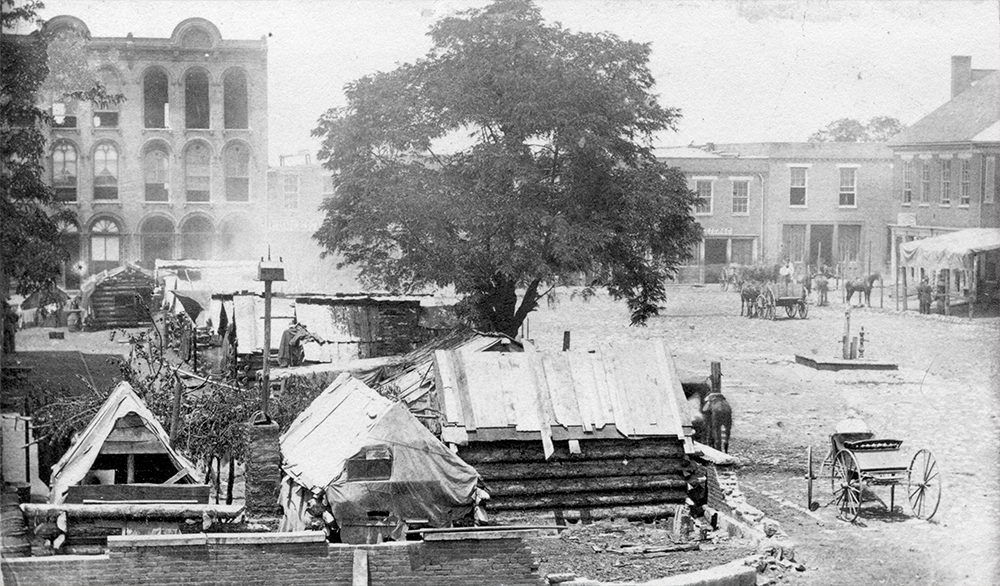
Murfreesboro is a pretty place with a fine brick courthouse in the centre of the public square. The Odd Fellows Hall is on the east side of the public square, each side being filled with brick stores. There is a regiment just come onto the square [with] the music playing. They moved like clockwork. And near the courthouse are lots of cannon with caissons ready to show their teeth to the enemy. The whole country around here is entrenched and cannon are perched at every prominent place.
I can see from the window more men under arms with music playing than could stand on the streets of Crown Point, and more mules and wagons than I ever thought was in the world all together.
“Butternuts and niggers are standing around gazing at the soldiers and other things that attract their attention. They are a miserable set of ignorant boobies. You can tell a secesh as far as you can see them.”
I think I shall go out to see the 73rd [Indiana] today if I can get a permit as everything has to be done by order or permission. The letters has to be ready for today’s mail before eleven and I must draw to a close as time and space will not allow of me much longer today at the desk. Sprague is writing to his folks. Oliver has lain down and a train of wagons is passing, both ends being out of sight. Butternuts and niggers are standing around gazing at the soldiers and other things that attract their attention. They are a miserable set of ignorant boobies. You can tell a secesh as far as you can see them.
From your affectionate husband, — Johnson Wheeler
1 Elihu Griffin (18301887) was a lawyer from Crown Point, Indiana. In 1862, he received an appointment as paymaster in the Army of the Cumberland and given the rank of Major. After the war he took a lucrative position with the Vincennes, Danville, and Chicago Railroad.
2 Quinine was the standard treatment for ague (malaria) during the Civil War and it frequently caused temporary hearing loss. Other reported symptoms of quinine use included vertigo, headache, nausea and vision loss.
The following letter was written by Oliver’s father, Johnson Wheeler (1797-1870) to Oliver’s mother.
Letter 8
Murfreesboro [Tennessee]
April 1st 1863
Dear wife,
Again I take my pen to write a few lines to let you know how we are. I was sick myself yesterday, taken with cholera morbus. It laid me broadside but I am up around this morning. Tuesday & Wednesday nights I had taken care of Oliver and did not sleep much. It was about the turning time with him. He looked very bad and was flighty and wandered in his mind. I thought his days were about numbered. His fever seems now entirely gone and we are giving him medicines to build him up. We give him wine mixed with extract Scinth____ two teaspoon fulls every two hours. He looks much better today and begins to want to eat. If there should be no relapse, I think he will come up. Our hospital [patients] are all on the mend, most of them, so as to be about.
I think I shall start for home in a day or two as I can’t stand it to be confined in the sick room. I shall soon be worse off than the rest. [Lt.] Ralph Upthegrove is here this morning just in from the regiment. He reports two or three sick with intermittent fever. They have taken their large tents and given them the shelter or dog tents as the boys call them.
Nothing new about town. the same old story—soldiers, mules and niggers.
From your affectionate husband, — Johnson Wheeler

The following letter was written by Sgt. Andrew Sprague of Co. A, 73rd Indiana Volunteers, to Oliver Wheeler’s father.
Letter 9
Hospital No. 7
Murfreesboro, Tennessee
April 3rd 1863
Mr. Wheeler
Dear Sir,
I will write a few lines to you this morning. Oliver took a little cold yesterday and has not been quite as well since but he is a good deal better this morning than he was yesterday afternoon. I do not think it will last him long for it did not affect his appetite as it did before when he took cold. He takes cold very easy. All continues just as it was when you was here.
We do not hear any news and there is nothing of any account to write about in the hospital. You know how dull it is here and since you left. it seems worse than it did before. I stay in the hospital all the time almost. I do not go out as much as I did when you was here. I have a very lame back. It hurts me to go up and down stairs so I do not go out often/
No more this morning. Yours respectfully. — A. M. Sprague
I have no postage stamps and cannot get any till afternoon so I shall have to have this franked.
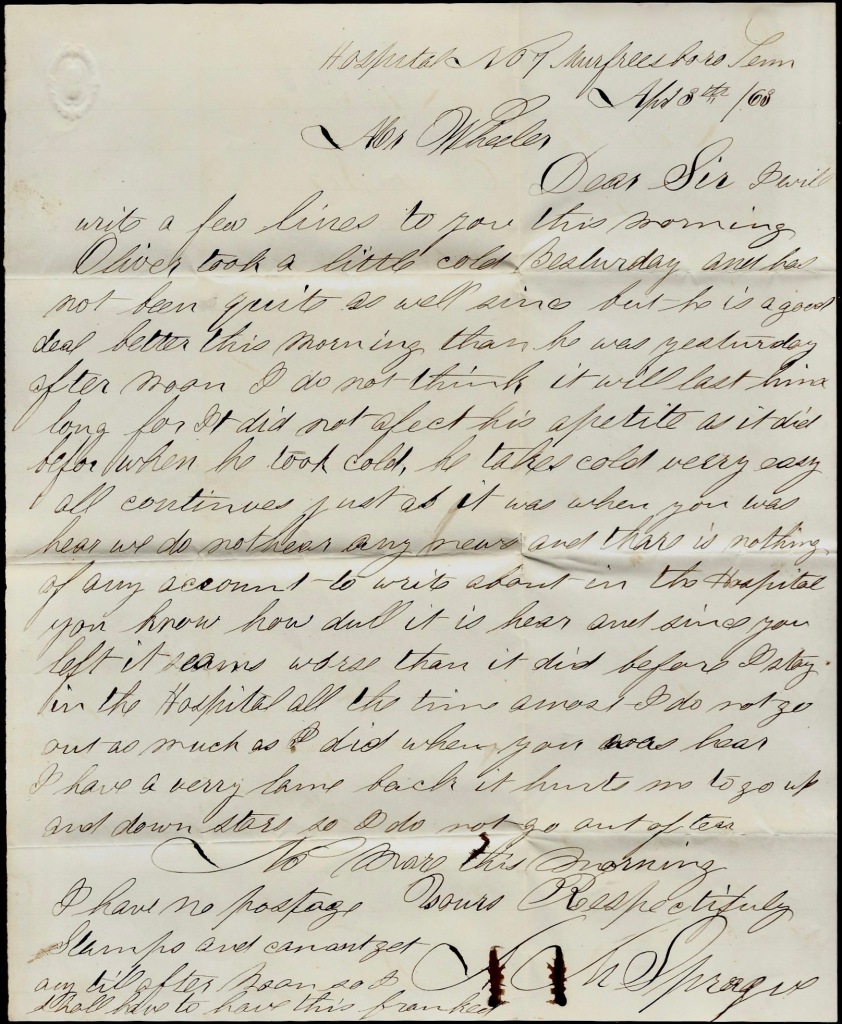
Letter 10
Point Rock Bridge, Alabama
January 4, 1864
Dear Father,
I am once more with my company after an absence of over a month. I left Nashville on the 31st in charge of 40 men of our regiment. Arrived at Stevenson [on] New Years and a dreary old New Years it was—cold and stormy. I got all the men into the Soldier’s Home so we was quite comfortable. We heard there that the regiment was at Huntsville but the Point Rock Bridge was burned and there wouldn’t any trains run through for a few days but there was a construction train going to run down as far as the bridge so we concluded we would go as far as that and walk the balance of the way if we couldn’t meet a train from Huntsville. But when we got to this place, I found Co. A with three other companies of our regiment here. They came here New Years morning. There was one company of the 13th Mississippi Vols. of our brigade captured here. They burnt the bridge and destroyed everything. The bridge builders are at work at the bridge and will have it finished this week.
Our regiment is scattered along the railroad from Decatur to this place. It seems impossible to keep our regiment together anymore. The boys got orders to put up winter quarters at Huntsville and thought they would stay there all winter but they didn’t stay there over a week before they got orders to guard the railroad. Our Colonel is commanding the brigade now and Granger is commanding the Department of Northern Alabama. I don’t think they will keep us here long but we will be apt to stay along this railroad somewhere all winter.
I suppose Roll D. Fowler has started back before this. Some of the boys got a letter from home and they said some of our folks had their fortune told by the gypsies and they said I would be home Christmas. They were fooled that time.
We have very comfortable quarters here but it’s a God forsaken hole—all rocks. Well I must close for the train is going out and I want to send this by it. Write often.
— Oliver
Letter 11
Heavy Artillery
Nashville, Tennessee
February 19, 1864
Dear Father,
As I have not written to you for some time, I will try and write you a short letter. I heard about a week ago you was sick and began to feel quite anxious until yesterday [when] I received a letter from Margaret stating you was better and able to get round the house. I sent a few lines by Shaffer but was in such a hurry I could not write much. We have had very cold weather for a few days. I suppose we feel it worse having had such warm weather so long. I guess the army will begin to move pretty soon now. There was twelve hundred mules and four hundred wagons started for the front the other day.
I see by the papers that Col. Strait with several other officers have made their escape from Richmond.
The old troops begin to come back but they are not in as good spirits as they were when they went home. We heard this morning we were regularly transferred to Heavy Artillery. I am in hopes we are. They sent in a drill master this morning that looks some like staying here. Have you seen anything of our recruiting officer there? I am afraid he will fail to get many recruits.
I got a letter from Kel Burnham the other day. He was in good health with the exception of his leg. He wanted me to try and come down but I guess I will not try again. Lt. [George] Clark is still on detached duty. We have a Lt. by the name of Robinson commanding now and he is a fine fellow. He has been in the hospital a long time and is not well enough to march so they put him over us. Our company are all well except one. He is in the hospital. His name is McCann. Jake Lill has been rather down in the mouth. His girl has played off on him. He took it quite to heart but I guess he will come out all right.
[Rolland] Fowler has been in quite a passion for a few days. It seems his recruiting commission was approved the next day after we left Indianapolis and forwarded to Crown Point in care of his father and he has never sent them to him. I suppose they are not good for anything now. They might be good to go home on if he had them.
I was in hopes you will not try to do anything again until you get well for you will surely get sick every time you try. I am in hopes I shall get home this fall. I begin to get anxious to have this cruel war end. We will have to muster for pay again this month. We will have four months pay due us at the end of this month. I must close for this time. Have mother write some. Give my respects to all and write soon.
— Oliver
Letter 12
Heavy Artillery
Nashville, Tennesee
February 21, 1864
Dear Father,
I have been expecting a letter from you for some time. I begin to think you must be so sick you can’t write but the last I heard you was able to get round the house. I am in hopes I will get one from you tomorrow.
Today is Sunday and I have been down to the burying ground. It was full of people. I was down to find Thomas [W.] Loving’s grave. 1 His wife wrote to us requesting us to send him home but we could not find it and I guess it would be impossible to send him now. He has been dead so long.
We got our pay payday. I sent $50 to you. Our company sent $400. We sent it to Luther. You can get it of him. There is nothing new. I believe the company are all well at present. You must be very careful of your health and not work.
We are all getting the Gold Fever. The boys are all going to Idaho as soon as the war ends. I suppose Holt is there long before this. He couldn’t have got his furlough if he hadn’t got a Surgeon’s Certificate of Disability. I don’t think that is hardly right. We have got some men in our company that have never been home and their family are sick and they can’t get a furlough. A man can get his discharge here quicker than he can get a furlough.
I am in hopes we will all be home by fall. I must close for this time. Write soon. — Oliver
1 Sergt. Thomas W. Loving (1834-1863) served in Co. A, 73rd Indiana Infantry. He died at General Hospital No, 2 in Nashville on 30 September 1863. He is buried in the Nashville National Cemetery, Section E, Site 1321. He was married in 1856 to Caroline Spray.
Letter 13
Heavy Artillery
Nashville, Tennessee
March 4, 1864
My Dear Father,
This will make the 4th letter I have written since I have received one from you. I begin to think you are so sick you can’t [write], but I should think some of the girls would write if you was sick. It has been nearly 4 weeks since I have heard from home. I think the mail must have laid over somewhere for you must surely some of you wrote in that time.
It has been quite stormy and cold for the past week but has cleared off and is quite pleasant today. The river has raised about 14 feet. We have been making a new house and was living in big style until the rain came and it gave us a good wetting. We covered it with canvas and thought it would shed the rain but we did not get pitch enough to it. But I think we have got the dead wood on it now. We put on a good coat of coal tar today so I guess it will not leak anymore.
We mustered for pay the last of February. I don’t know wether we will get it soon or not. I sent you $50. We all sent $400 to Luther but haven’t heard from it yet. We sent it about the 20th of February.
The 9th Indiana Regiment left here for the front yesterday. They said they got between three and four hundred recruits—that’s doing pretty well in so short a time. They did not feel quite as well as they did going home. I guess they calculated to stay there all winter when they reenlisted. There is four or five regiments going to the front every day now. I think there will be some pretty exciting news from the front soon. I think they have commenced the spring campaign pretty early. However, it’s an early spring but I guess there will be some cold weather yet.
We have had very pleasant warm weather here ever since New Years. There is no end to Government Stores coming through here now. Gen. Ward’s Brigade left here for Chattanooga last week. We was in his Brigade until lately. We were put in Granger’s Reserve Brigade. I think we will stay here for some time yet. A part of the regiment was relieved up at the State House by some Tennessee Battery. They went to Fort Negley after they were relieved. There was some talk of our being transferred to Heavy Artillery but I guess it all fell through with. There are not many soldiers around here now—only our brigade of infantry. There is a good many cavalry here yet but they are leaving every day.
Our company only take charge of three guns now so it makes it easier guarding. Well, I must close as it is getting late. Hoping to hear from you soon. I shall begin to think something is the matter if I don’t hear from home tomorrow. My love to all.
— Oliver
If you are not able to write, have Mother write for you. You must be careful of your health and not try to do anything.
Letter 14
Stockade No. 2
N. & C. Railroad
May 27, 1864
Dear Father,
I thought I would wait until I heard from you before I wrote again. I think your letters must have been miscarried so I will write once more. We got marching orders yesterday. We will be relieved this week by Hundred Days Men. I suppose we will go to the front or to guard trains. We heard this morning we were going to guard a pontoon train through but I can’t tell. It will come pretty hard on us marching this warm weather. We have laid around so long the boys don’t like the idea of leaving this place much for it’s the pleasantest place we ever got into before.
We got four months pay on the 17th. We expressed a package of $1,368 to Luther. I sent you $75. I also sent a sash yesterday in a box the boys sent to Luther. You can go there and get it.
The 12th Indiana Cavalry are here in Nashville now. Capt. [Almon] Foster and Lieut. [Maurice] Sheehan have been over and stayed over night with us. Major Pratt and wife were over yesterday. He puts on some airs. Tommy Sheehan is his orderly. His wife is going to return home in a few days. I guess Lieut. Sheehan will go with her and fetch up the boys that were left at Kendallville. I believe the most of the new regiments have got to go into infantry. They don’t like that much but I guess they will have to come to it.
We are having splendid weather here now—rather warm for comfort. We have strawberries now every day. We can get them for a shilling a quart. We can get all the onions, radishes, peas, and all kinds of vegetables we want now.
The boys are all with the company now except the one that had the small pox. He is in the hospital at Nashville. We are all well now. I haven’t received a letter from home for over two weeks. I think I will get one tonight. The boys are all packing up and fixing for a march. I must close for this time hoping to hear from you soon.
Give my respects to all the friends. Your affectionate son, — Oliver
Letter 15
Mooresville, Alabama
September 16, 1864
Dear Father,
You will see by the heading that I am once more here where I first wrote you from Alabama. We left the stockade on the 19th of August and went to Triana and stayed until the last day of the month when we got marching orders. We had just got through mustering for pay when the order came to go to Elk River Bridge which is about 40 miles from Decatur. We left about half of the regiment at Triana to hold that place and left Lt. Clark in command. We then marched to Decatur in Tennessee that night and in the morning took the train and arrived at Elk River about noon. They have two stockades there and a small fort which is called Ft. Prospect. The stockades are garrisoned by Colored Troops. There was a part of the 10th Indiana Cavalry there also. They were expecting Gen. Wheeler through there every moment.
Our regiment went into the fort which is on a high hill and not a tree or any shade. The boys were nearly all sick. My company all got sick but three. They put us on half rations all the time we were there but we had a plenty for we killed a hog every day and foraged potatoes &c. so we got along very well. We stayed there until yesterday when the balance of the regiment met us here. I never was so glad to get away from a place before as I was to get away from Ft. Prospect. We did not take along anything—only what we had on and one blanket, so you may imagine we were some dirty and could find a greyback now and then.
We were gone 16 days from the company. I believe there was force enough after Wheeler to surround him if they had half tried but I guess he has got away safe now. He fired into a train of cars about two miles from us the first night after we got to Elk River. Our company was on picket then. There was an outpost of cavalry [and] when the rebs fired, the cavalry put spurs to their horses and skedaddled into camp, left their blankets and everything. Our boys saved them the trouble of coming back after them. Their Colonel came along and gave them a good cussing and told them to go back and if they left their posts again without firing a shot, he would have them all shot. I don’t have a very good opinion of our new cavalry. They seem to be rather cowardly. Gen. Granger came along the next [day] and said he would rather have a dozen good niggers than the whole of them.
I don’t know where we will go to from here. I think we will go onto the railroad again. There is three companies in the railroad now. I guess going home to election is played out.
I got a box of pills you sent me and also a letter last night—the first mail we have had since the first as there has been no trains from Nashville in this road until yesterday. I got a letter from Eunice last night. She writes that David Burnham 1 was killed at Atlanta. I suppose the draft is over by this time. I would like very much to hear who they are. Well I must close for this time as my paper has given out. My health is very good now but they keep me pretty busy now days so I don’t have much time to write—only at night. But will try to send a letter more promptly in the future. Give my respects to all. — Oliver
I guess this will puzzle you to read this for I have to write on a board.
1 1st Sergt. David T. Burnham of Co. A, 99th Indiana Infantry was killed on 21 August 1864 near Atlanta, Georgia.
Letter 16
Nashville, [Tennessee]
December 18, 1864
Dear Father,
It is Sunday once more and let me see, it has been nearly a month since I came here. I have written several times to you and sent home money when I first came here but haven’t heard a word from either. I think I shall get a letter today. If I don’t, I shall be disappointed and think you are sick.
R[olland] D. Fowler and John Tanner of our company started home yesterday morning on a sick furlough. Our old Surgeon is in charge of a hospital here and he got it for them. They are neither of them sick.
I suppose you have heard long ere this of the great battle that has been fought here so I will not undertake to describe it. Our Dutch [German] conscripts was put in with a lot of raw recruits, conscripts, &c. and I guess it was a good thing for us for they put us behind breastworks and if we hadn’t been with them, they would have put us in with some old regiment and shoved us to the front.
I was out to see the rebel works yesterday. They had two lines and they were very strong. They were better than ours if anything. We never could have got them out if they hadn’t flanked them. They have got about eight thousand of the Johnnies prisoners here. They look pretty hard—poorly clothed—some without shoes entirely.
I never saw such a muddy time in Nashville as it is now and every street is crowded with teams loaded with rations, forage, &c.
I suppose Fowler has told you all the news before now so I will close. My respects to all. — Oliver



